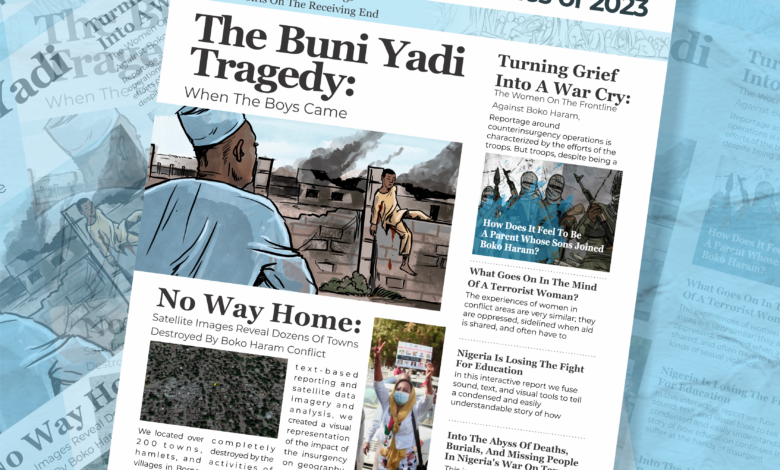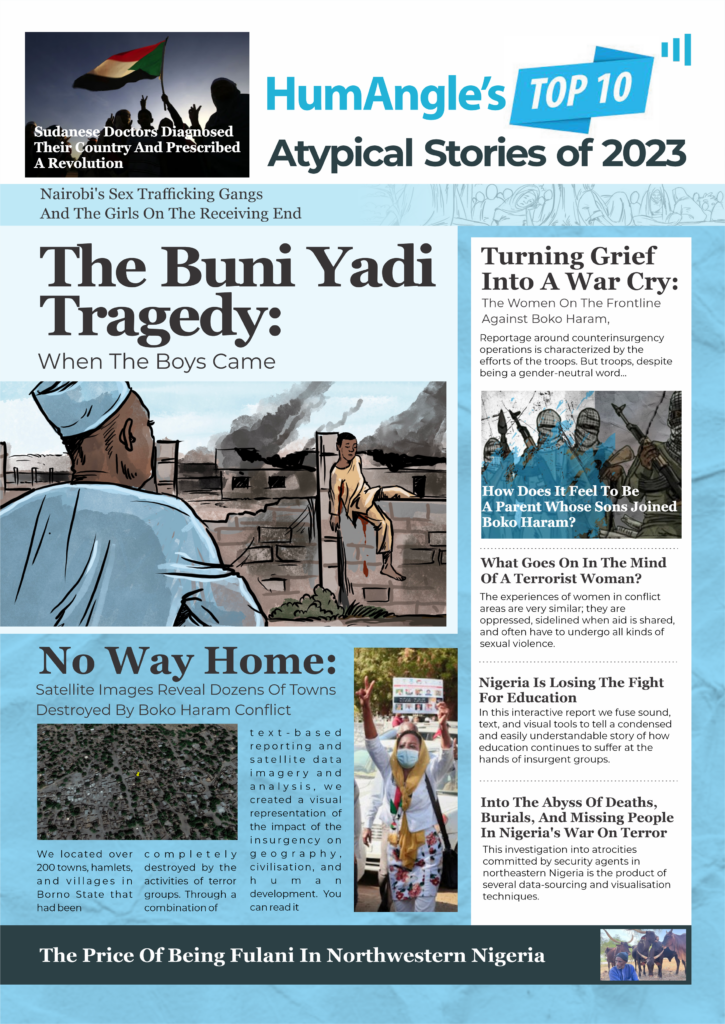HumAngle’s Top 10 Atypical Stories Of The Year
HumAngle has published a wide range of stories this year. Stories that are unique and diverse. In no particular order, here are the top 10 stories we think were most unique, whether in terms of reporting style, location, topic, or methodology.

1. The Buni Yadi Tragedy: When The Boys Came
In January 2023, we started to publish a series of reports around the Buni Yadi massacre of school boys in 2014 by the Boko Haram terror group. The stories followed the experiences of the victims who had died through interviews with their family members and the experiences of people who survived through interviews with them. The approach we took with the reportage tried to play with form; in one report, we attempted to tell the story without weaving any direct quotes from the interviewee into the report, but having them as standalone quotes that punctuated the report. In another report, we attempted to weave the storytelling around a poem about the massacre that had been written by another Nigerian poet, Gbenga Adesina, using quotes from the poem as outstanding guides.
2. No Way Home: Satellite Images Reveal Dozens Of Towns Destroyed By Boko Haram Conflict
We located over 200 towns, hamlets, and villages in Borno State that had been completely destroyed by the activities of terror groups. Through a combination of text-based reporting and satellite data imagery and analysis, we created a visual representation of the impact of the insurgency on geography, civilisation, and human development. You can read it here.
3. Turning Grief Into A War Cry: The Women On The Frontline Against Boko Haram
Reportage around counterinsurgency operations is characterised by the efforts of the troops. But troops, despite being a gender-neutral word, often appears to mean men. In this report, we spoke with and documented the experiences of women who are on the frontlines fighting the Boko Haram terror group in Nigeria’s northeastern region.
4. How Does It Feel To Be A Parent Whose Sons Joined Boko Haram?
There isn’t a shortage of stories on the horrors Boko Haram has brought to civilians in the Lake Chad region, but there just might be a shortage of stories on the ripple effects of the terrorists joining the group, especially for those who were not born into it. How does it feel to be a parent to a man who denounced everything you have raised him with and join a deadly terror group? This story tells us that.
5. What Goes On In The Mind Of A Terrorist Woman?
The experiences of women in conflict areas are very similar; they are oppressed, sidelined when aid is shared, and often have to undergo all kinds of sexual violence. But there are many other forms that their experiences take. Sometimes, they are willing participants in the infliction of terror. What goes on in the mind of a terrorist woman? Here is a window into Mariam’s mind.

6. Nigeria Is Losing The Fight For Education
In this interactive report, we fuse sound, text, and visual tools to tell a condensed and easily understandable story of how education continues to suffer at the hands of insurgent groups. The report can be savoured with or without sound and on mobile devices or computers, but a computer gives a more enjoyable experience with the sound enabled.
7. Into The Abyss Of Deaths, Burials, And Missing People In Nigeria’s War On Terror
This investigation into atrocities committed by security agents in northeastern Nigeria is the product of several data-sourcing and visualisation techniques. It involved interviews with dozens of sources, data obtained from whistleblowing, and an extensive analysis of satellite data that uncovered fresh evidence. Because of the shortage of regular satellite imagery in the region, the open-source intelligence analysis relied on a method that’s rarely applied in journalism, involving the use of microwave energy to detect surface and sub-soil changes. The interactive map embedded in the report is also one-of-a-kind in the local media space.
8. The Price Of Being Fulani In Northwestern Nigeria
The Fulanis have been seen, for a long time, to be perpetrators of violence in Nigeria, especially in the northern region. In this report, we show that they, too, are often victims, even in communities that belong to them.
9. Sudanese Doctors Diagnosed Their Country And Prescribed A Revolution
The report starts with this subheadline: when the Sudanese people trooped to the streets in Dec. 2018, frustrated by the country’s worsening economy, physicians were at the frontlines in ensuring those grievances led to broader political reforms. How? Find out here.
10. Nairobi’s Sex Trafficking Gangs And The Girls On The Receiving End
The report’s subheadline: Organised sex trafficking networks operating in Kenya’s capital city prowl rural communities for vulnerable girls. They promise them an escape from poverty. Instead, they lock them up in hotel rooms with tourists who abuse them for many months — often without consequence.
Support Our Journalism
There are millions of ordinary people affected by conflict in Africa whose stories are missing in the mainstream media. HumAngle is determined to tell those challenging and under-reported stories, hoping that the people impacted by these conflicts will find the safety and security they deserve.
To ensure that we continue to provide public service coverage, we have a small favour to ask you. We want you to be part of our journalistic endeavour by contributing a token to us.
Your donation will further promote a robust, free, and independent media.
Donate HereStay Closer To The Stories That Matter




